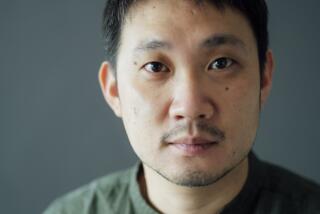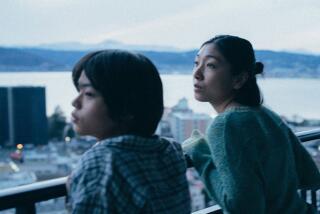Loss, Longing and Discovery at Center of Inviting ‘Kikujiro’
- Share via
When a Takeshi Kitano picture opens with little boys walking down a busy Tokyo street and changing their route to avoid a group of older bullies, you have every reason to anticipate that this will deliver them right smack into the hands of kidnappers. However, with “Kikujiro,” Kitano, nonpareil portrayer of world-weary cops and gangsters in his stylish--and bloody--films noir, is taking us in a different direction. The result is a heart-tugger made totally irresistible because of the combination of Kitano’s wry, sly sense of humor and his rigorous detachment.
The smaller of the two boys, Masao (Yusuke Sekiguchi), lives with his grandmother (Kazuko Yoshiyuki), who works at a nearby sushi stand, but as a lonely summer descends upon him he feels a renewed longing for his mother; his grandmother has told him that his mother is working hard on his behalf at a job in a distant city and his father was apparently killed in an accident.
When he discovers a picture of the mother and her address, he prepares to run away to find her. Before he can do that, he winds up with one of his grandmother’s friends, who gets her irascible, gambling husband, Kikujiro (Beat Takeshi, Kitano’s performing name), to accompany him.
Feisty and combative, Kikujiro is a guy who’s always working an angle that more often than not backfires on him. He’s a gruff, tough guy who doesn’t take anything from anybody--even if it leaves him beaten to a pulp. He’s not so fearless as simply hotheaded and headstrong, a guy who often acts before he thinks. He’ll get lucky gambling only to gamble away his winnings, which leaves him and Masao broke and forced to hitchhike their way to their destination, which makes for some highly comical encounters with strangers along the way.
In a deliberately roundabout way, Kitano is building to a moment of truth that is a knockout and allows Kikujiro to see himself in a completely different way in relation to Masao. Kitano’s craggy, rough-hewn face, with its features perfect for playing stoics, is the ideal countenance to set off the paternal feelings Kikujiro begins to feel. As a filmmaker and as an actor, Kitano gives a unique, distinctive impact to a classic father-son type relationship.
If Kitano’s vision is comical, it is also discreetly distanced in dealing with serious feelings. Kitano understands the pain of loss and longing; he respects the sacredness of the most intense emotions, the ways in which they render us vulnerable and how we crave and deserve privacy when they hit.
With its largely rural and spacious settings, “Kikujiro” is a beautiful, warm and inviting film with a distinctive structure and composition--and a totally captivating score by Joe Hisaishi. Kitano and Sekiguchi are pretty captivating too. The film runs at least 15 minutes too long but is so appealing it’s easy to overlook. (This is one of those times when you feel even the most talented of auteurs might benefit from a strong producer.)
* MPAA rating: PG-13, for some sexuality and language. Times guidelines: some crude humor but fine for older children.
‘Kikujiro’
Beat Takeshi: Kikujiro
Yusuke Sekiguchi: Masao
Kayoko Kishimoto: Kikujiro’s wife
Kazuko Yoshiyuki: Masao’s grandmother
A Sony Pictures Classics release of a production of Bandai Visual, Tokyo FM, Nippon Herald and Office Kitano. Writer-director-editor Takeshi Kitano. Producers Masayuki Mori, Takio Yoshida. Cinematographer Katsumi Yanagishima. Music Joe Hisaishi. Costumes Fumio Iwasaki. Art director Norihiro Isoda. Set decorator Tatsuo Ozeki. Running time: 1 hour, 56 minutes.
At selected theaters.
More to Read
Only good movies
Get the Indie Focus newsletter, Mark Olsen's weekly guide to the world of cinema.
You may occasionally receive promotional content from the Los Angeles Times.










